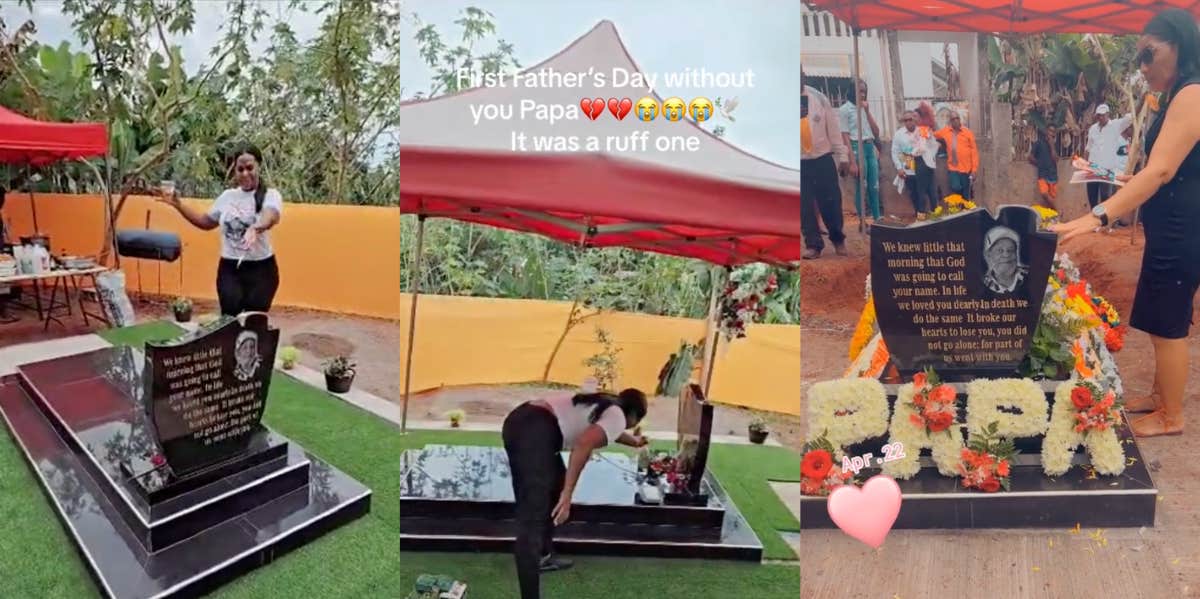Woman Honors Her Passed Father By Burying Him In Her Backyard — 'What's The Difference Between This & An Urn?'
Many people were shocked by the site of a backyard grave, but for some cultures, it's a long-held tradition.
 @toocuteshanz / TikTok
@toocuteshanz / TikTok A woman on TikTok has left many people surprised with the unusual way she chose to make her father's recent passing — by putting him to rest at her home rather than at a cemetery.
Many people online were shocked by her decision. But others felt it was a particularly moving way to memorialize a loved one, and it turns out many cultures do so in exactly the same way.
The woman went viral for burying her father in her backyard.
TikToker "@toocuteshanz" has been honoring her recently passed Papa Huby Powis with her TikTok channel, which has been dedicated almost entirely to his memory since he passed away in March. She's shared glimpses of his funeral, photos, and the way she marked her first Father's Day without him.
But one video, in particular, has caught the internet's notice in a big way — a clip of Shani walking around the immaculate grave for her father that she set up in her backyard. In many ways, it looks like any other grave you might see in a cemetery — a beautifully polished stone marker along with an engraved headstone with her father's name and a short obituary.
The only difference of course is that her father's grave is behind her home in Clarendon, Jamaica, and it's left lots of people online expressing shock at what they see as a strange way to honor the passed.
Many people online have been shocked by Shani burying her father in her backyard, but others think it's a beautiful way to honor him by keeping him close.
Of course, many people's initial reaction was the one that many of us would expect — isn't this kind of creepy? Many people said they felt they'd be weirded out by seeing their loved ones' graves just sitting outside the house. One person on Twitter felt like they'd end up overcome with grief every time they walked out the back door, as they expressed with a hilarious meme.
 Photo: Twitter / @FamousCloudzz
Photo: Twitter / @FamousCloudzz
Others couldn't wrap their head around the logistics — several wondered what happens to the grave if you move away, or your house is repossessed, or there's a natural disaster.
But many others thought Shani's way of doing things was a beautiful and heartfelt way to deal with the passing of a loved one. "She can visit [him] every. single. day. What's wrong with this? Normalize this!" one person wrote on Twitter, while a TikToker wondered, "what's the difference [between this] and having the [urn] full of ashes on the fireplace inside the house." For her part, Shani heartily agreed, writing "thank you" in response.
Burying family members at home is a tradition common to many cultures.
The tradition reflects different views on death than those that are common in the rest of the world. On TikTok, several people who are part of Nigeria's Igbo ethnic group couldn't help but laugh at all the uproar over Shani's video, because in their culture, burying the dead at home is simply common practice.
Or as one commenter put it, "pls my grandma is buried outside the kitchen, this is normal." The practice is common among many other cultures and regions in Africa as well. Some cultures also incorporate the deceased's work into the burial rite — farmers, for instance, are sometimes buried at their homes facing east, a nod to the sunrise that would rouse them to begin working their land during their life.
It's all related to very different attitudes toward death in these cultures that are distinct from many Americans and Europeans. Death in many of these cultures signifies the departed rejoining their ancestors in the afterlife.
While mourning is a part of the loss in nearly all human cultures — even Shani has been candid about the grief she feels at the loss of her father — many cultures consider death to be more about remembering the life the person led while they were alive, rather than a macabre, frightening thing to be avoided.
There's something truly beautiful about having your father laid to rest in the place he called home rather than a cemetery, an impersonal plot of land the express purpose of which is keeping the dead away from the living. It may not be for everyone, but Shani's way is a much more inspiring view of death — one that keeps our loved ones close to us even after they've left.
John Sundholm is a news and entertainment writer who covers pop culture, social justice and human interest topics.
